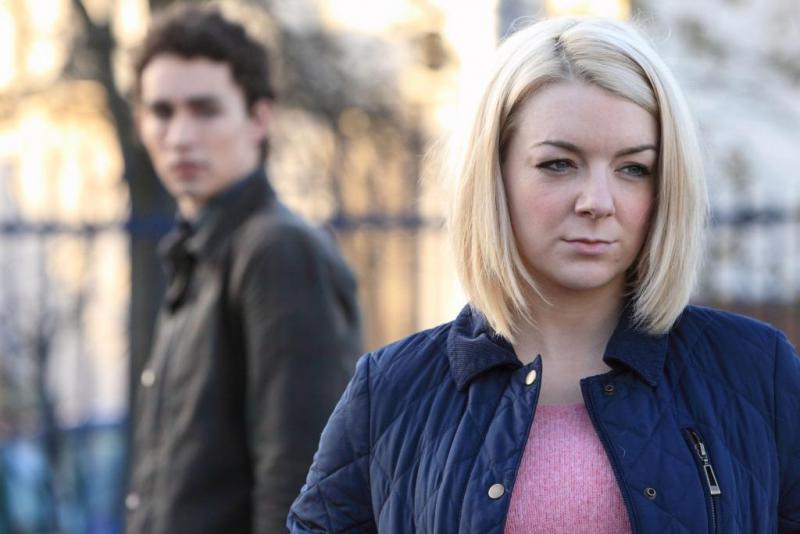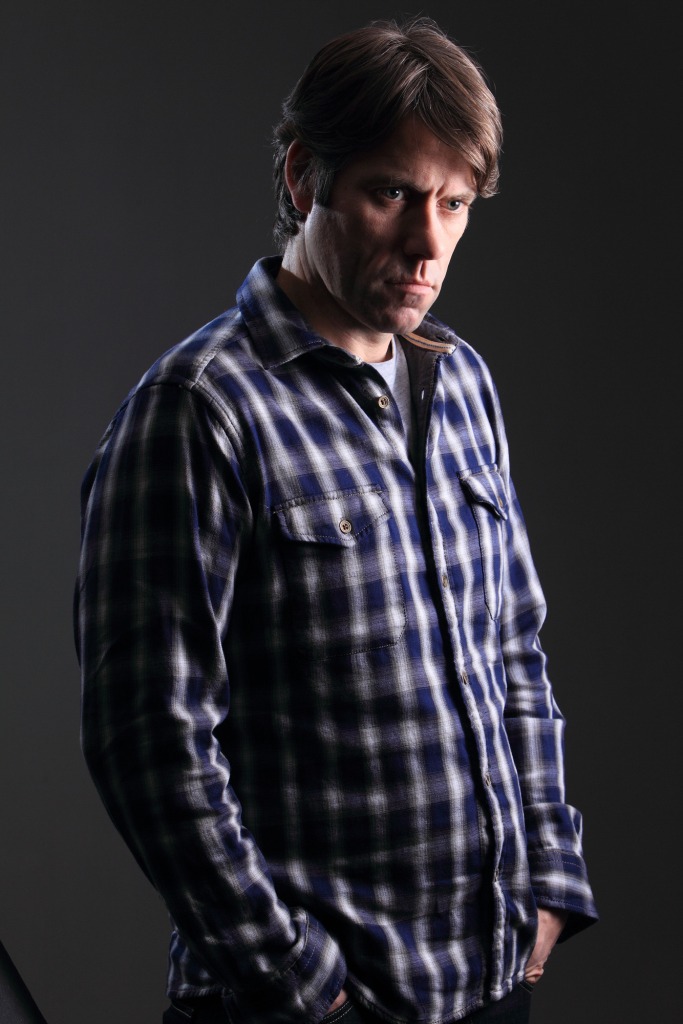Accused, Series Two, BBC One | reviews, news & interviews
Accused, Series Two, BBC One
Accused, Series Two, BBC One
The cast are excellent but Jimmy McGovern's script struggles to transcend miserabilism-by-numbers

Jimmy McGovern’s one-man mission to boost the quota of Scousers seen on the small screen continues in “Stephen’s Story” – the latest bout of button-pushing misery otherwise known as Accused. Seventeen-year-old Stephen Cartwright’s beloved Irish mother is bedridden but this doesn’t stop him table-ending his girlfriend. McGovern and co-writer Danny Brocklehurst thus immediately raise the twin pillars of drama: death and sex.
They are embodied – literally – in the pneumatic figure of Charlotte, a palliative care nurse who eases Mrs Cartwright’s passing with morphine and then – with shocking speed – eases herself into Mr Cartwright’s bed. Unsurprisingly, the grief-stricken Stephen calls her “a slapper” – and Charlotte (a harlot at heart) does nothing to contradict this, showing too much cleavage even though she is soon living in a house with two teenage boys.
McGovern’s determination to bring the house down buries any potential catharsis under rubble
Has Stephen raped her? We know he is in the dock for something. At first he seems like the archetypal young man, suffering from sensory overload and lashing out at an uncomprehending world. Director David Blair makes this explicit with dazzling montages of scattering skittles (Stephen works in a bowling gallery) and flashing, bleeping machines in an amusement arcade. The bereaved boy accuses anyone who expresses sympathy of “buzzing on” his tragedy – the same charge can be levelled at the viewer too – however it becomes apparent that he has always been a sensitive child, “never quite there”. His remaining family members – and Charlotte – think he is going mad.
McGovern and Brocklehurst, like all artists worth their salt, are having it both ways. The most blatant example of this is the closing scene where a victorious Charlotte – now recovered from the stabbing that got Stephen banged up – tells him that his father and his younger brother are both ill. Stephen attacked her because he was convinced the wicked stepmother was poisoning him.
 This last-minute twist poisons the production too. What begins as a serious study of physical loss and mental disintegration degenerates into Gothic melodrama. The usual hallmarks of McGovern miserabilism – wan, wintry light; shots of rain-soaked social housing; TV aerials against grey skies; pylons processing across windswept landscapes – become nothing more than the equivalents of creaking doors, cobwebs and unquiet corpses. It’s enough to make anyone give up the ghost.
This last-minute twist poisons the production too. What begins as a serious study of physical loss and mental disintegration degenerates into Gothic melodrama. The usual hallmarks of McGovern miserabilism – wan, wintry light; shots of rain-soaked social housing; TV aerials against grey skies; pylons processing across windswept landscapes – become nothing more than the equivalents of creaking doors, cobwebs and unquiet corpses. It’s enough to make anyone give up the ghost.
That’s not to say the production isn’t enjoyable in a cheap kind of way. An excellent cast give it their all. Robert Sheehan, as Stephen, makes the most of his Velcro eyebrows and mournful eyes.Sheridan Smith even manages to make the man-eating Charlotte genuinely attractive at times. The weakest link – proving the old adage about never working with children and animals (a Jack Russell also falls into Charlotte’s web) – is John Bishop (pictured right). The comedian can, of course, do comedy and anger but other emotions are beyond him: you can see him straining for something that simply isn’t there. Alastair Campbell – the ghost in the machine – a talking-head who talks directly to Stephen from the TV, sends himself up nicely, warning him that Charlotte is “a crafty cow”.
A kitschy picture hanging above the dying mother’s bed – the subject of an early close-up – burbles: “A house is made of walls and beams; A home is built with love and dreams”. Stephen, after Charlotte has moved in with the Cartwrights, finds the picture in a dustbin. His inability to move on should be moving but somehow it isn’t. McGovern’s determination to bring the house down buries any potential catharsis under rubble.
Twenty years ago Tony Marchant (whose Leaving is coming up shortly on ITV) wrote a series about terminal illness and grief. Goodbye Cruel World starred Sue Johnston and Alun Armstrong but a young unknown stole the show. His name? Jonny Lee Miller. Don’t be surprised if Robert Sheehan follows in his footsteps.
Add comment
The future of Arts Journalism
You can stop theartsdesk.com closing!
We urgently need financing to survive. Our fundraising drive has thus far raised £49,000 but we need to reach £100,000 or we will be forced to close. Please contribute here: https://gofund.me/c3f6033d
And if you can forward this information to anyone who might assist, we’d be grateful.

Subscribe to theartsdesk.com
Thank you for continuing to read our work on theartsdesk.com. For unlimited access to every article in its entirety, including our archive of more than 15,000 pieces, we're asking for £5 per month or £40 per year. We feel it's a very good deal, and hope you do too.
To take a subscription now simply click here.
And if you're looking for that extra gift for a friend or family member, why not treat them to a theartsdesk.com gift subscription?
more TV
 Down Cemetery Road, Apple TV review - wit, grit and a twisty plot, plus Emma Thompson on top form
Mick Herron's female private investigator gets a stellar adaptation
Down Cemetery Road, Apple TV review - wit, grit and a twisty plot, plus Emma Thompson on top form
Mick Herron's female private investigator gets a stellar adaptation
 theartsdesk Q&A: director Stefano Sollima on the relevance of true crime story 'The Monster of Florence'
The director of hit TV series 'Gomorrah' examines another dark dimension of Italian culture
theartsdesk Q&A: director Stefano Sollima on the relevance of true crime story 'The Monster of Florence'
The director of hit TV series 'Gomorrah' examines another dark dimension of Italian culture
 The Monster of Florence, Netflix review - dramatisation of notorious Italian serial killer mystery
Director Stefano Sollima's four-parter makes gruelling viewing
The Monster of Florence, Netflix review - dramatisation of notorious Italian serial killer mystery
Director Stefano Sollima's four-parter makes gruelling viewing
 The Diplomat, Season 3, Netflix review - Ambassador Kate Wyler becomes America's Second Lady
Soapy transatlantic political drama keeps the Special Relationship alive
The Diplomat, Season 3, Netflix review - Ambassador Kate Wyler becomes America's Second Lady
Soapy transatlantic political drama keeps the Special Relationship alive
 The Perfect Neighbor, Netflix review - Florida found-footage documentary is a harrowing watch
Sundance winner chronicles a death that should have been prevented
The Perfect Neighbor, Netflix review - Florida found-footage documentary is a harrowing watch
Sundance winner chronicles a death that should have been prevented
 Murder Before Evensong, Acorn TV review - death comes to the picturesque village of Champton
The Rev Richard Coles's sleuthing cleric hits the screen
Murder Before Evensong, Acorn TV review - death comes to the picturesque village of Champton
The Rev Richard Coles's sleuthing cleric hits the screen
 Black Rabbit, Netflix review - grime and punishment in New York City
Jude Law and Jason Bateman tread the thin line between love and hate
Black Rabbit, Netflix review - grime and punishment in New York City
Jude Law and Jason Bateman tread the thin line between love and hate
 The Hack, ITV review - plodding anatomy of twin UK scandals
Jack Thorne's skill can't disguise the bagginess of his double-headed material
The Hack, ITV review - plodding anatomy of twin UK scandals
Jack Thorne's skill can't disguise the bagginess of his double-headed material
 Slow Horses, Series 5, Apple TV+ review - terror, trauma and impeccable comic timing
Jackson Lamb's band of MI5 misfits continues to fascinate and amuse
Slow Horses, Series 5, Apple TV+ review - terror, trauma and impeccable comic timing
Jackson Lamb's band of MI5 misfits continues to fascinate and amuse
 Coldwater, ITV1 review - horror and black comedy in the Highlands
Superb cast lights up David Ireland's cunning thriller
Coldwater, ITV1 review - horror and black comedy in the Highlands
Superb cast lights up David Ireland's cunning thriller
 Blu-ray: The Sweeney - Series One
Influential and entertaining 1970s police drama, handsomely restored
Blu-ray: The Sweeney - Series One
Influential and entertaining 1970s police drama, handsomely restored
 I Fought the Law, ITVX review - how an 800-year-old law was challenged and changed
Sheridan Smith's raw performance dominates ITV's new docudrama about injustice
I Fought the Law, ITVX review - how an 800-year-old law was challenged and changed
Sheridan Smith's raw performance dominates ITV's new docudrama about injustice

Comments
I disagree about John
I thought John Bishop was
Robert Sheehan was superb in
I was the Prison Guard at the